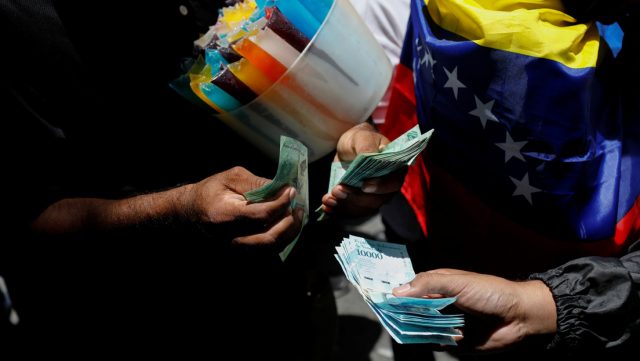At the beginning of August, the Government of Venezuela announced the creation of ‘Bolívar Digital’, a measure that has been presented as necessary to recover the country’s economy and «advance towards productive development», with special emphasis on seeking to raise, in the future, the purchasing power of the working class and facilitate daily retail transactions with the local currency.
For this, the Venezuelan Government has launched a new monetary expression that also aims to simplify transactions, computer systems and accounting records, a process that coincides with the deceleration of the galloping inflationary process that the South American country experienced for several years.
The Central Bank of Venezuela (BCV) reported at the time of the launch of the new Venezuelan currency, that this stage of the economy will begin on October 1 with an accounting factor that eliminates six zeros from the local currency in order to establish «a more simple money scale».
For example, an item that currently costs 1 million bolivars (1,000,000) will be worth 1 bolivar, and if the amount is less than or greater than that figure, it must be divided into one million.
According to the BCV, the introduction of the Digital Bolívar will not affect the value of the currency and will not, immediately imply, a change in the circulation of coins and bills.
Once the conversion is carried out, the BCV will begin to collect, progressively, the bills that are currently circulating, while introducing the new monetary cone that will be made up of one coin and five bills. In other words, bills of the current monetary cone and the new Bolívar will remain in circulation.
The banknotes that will circulate in physical form will have a value represented in bolivars of «5»; «10»; «20», «50» and «100». All will have the face of Simón Bolívar and will be differentiated by different colors and specific denominations.
Reconnect Venezuelans with the Bolívar
The Bolívar Digital seeks to reduce the use of cash and increase digital transactions in its different payment methods: transfers, mobile, text messaging, fingerprint, QR code, points of sale and others.
The launch comes amid the de facto dollarization that in recent years has taken hold of the country, to cope with hyperinflation, exacerbated by US sanctions.
Thus, the Government intends to initiate a process of recovery of the economy, cutting with the dependence of the dollar, in physical bills, for retail operations, so as to be able to restore the connection of the population with its currency: the Bolívar.
For this reason, and in parallel, the Venezuelan public and private banks advance in this path for the purchase and sale of currencies through their digital platforms, which allows account holders to carry out personal transactions to exchange bolivars for dollars and /or euros, or deposit foreign currencies to convert them into bolivars whenever they want.
This option, enabled in a large number of banks, allows savers to avoid hyperinflation by converting their bolivars into foreign currency. On a daily basis, these currencies average a value disclosed by the BCV and that is quite similar and sometimes even higher than the so-called «parallel average».
Digital ‘change’ in the banking system
Isnelda González, a user of the banking ‘change’ system (coins and bills for change), says that this mechanism is «very useful» because it allows her to exchange currency into bolivars for her daily purchases or even pay directly with her electronic currencies, using a special debit card provided by the banks.
This option, she says, although still viewed with suspicion, is quite reliable and is tailored to the user’s needs. In her case, the first time she used the platform, she deposited an amount of dollars, and kept them in her account until she needed to change them into bolivars.
«For example, you deposit 10 dollars and they appear in your account. Then, as you need bolivars, you change the dollars on the bank’s platform and pass the amount you require in bolivars to your checking account».
The system also allows you to buy dollars or euros from the bank with bolivars. This can be done to have electronic currencies or to withdraw them in cash, as long as the bank has availability of physical bills of dollars or euros, as they are scarce.
A viable and necessary measure
However, there are different opinions on this matter. In an article published in the local newspaper Ciudad Caracas, it is assured that the implementation of the digital economy is «viable and necessary», especially, «in the complex current circumstances» of the country.
«I am a faithful supporter of consolidating this scenario at some point, no matter how adverse the conditions seem, either due to the metabolic effect of the economic crisis or as a consequence of the insane blockade», says journalist Manuel Palma, who acknowledges that this process is not easy.
For the columnist, the digital economy could make the economic and commercial transactions easier. These transactions are now complicated by the time restrictions derived from the covid-19 pandemic, the shortage of plastics to make bank debit cards and the «cumbersome earthly and virtual procedures» required by banks to access their services.
Strategic and gradual bet to recover the Bolívar
After the launch of the new currency, the Vice President of the Republic and Minister of Economy and Finance of Venezuela, Delcy Rodríguez, commented that the new monetary cone and the implementation of the Bolívar Digital will consolidate a «strategic and gradual bet» for the recovery and stability of the Venezuelan economy.
Rodríguez commented that the new economic measures applied in the country are part of the Economic Recovery Program launched in 2018, which aims to promote a development model independent of the oil income.
The Finance Minister assured that this process seeks to cut off «the asphyxia» to which the population has been subjected to because of the US economic blockade, which has meant a 99% cut in the State’s income from the sale of oil, the main export product of the South American country.
Along these lines, the Venezuelan Executive is taking action with the private industrial sector to boost the productive apparatus, generate jobs, reduce unnecessary imports, save foreign exchange, recover the real income of workers and expand the potential of local companies, according to Rodriguez.
In addition to the Bolívar Digital, Venezuela also has the experience of the cryptocurrency «Petro» -created in 2017- a reference that the Venezuelan State uses for various transactions, such as bank loans, public work contracts, payment of taxes, collective labour agreements of workers, formalities of documents in public institutions, budgets, among other markers.
All this gives the Venezuelan experience with the digital economy its own characteristics. The government plan, in the midst of the complex dynamics of the country, not only seeks to face hyperinflation, but also to facilitate the daily transactions of a population that, for several years now, has experienced firsthand the consequences of the siege of the US sanctions.











